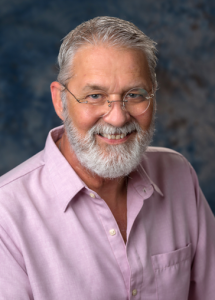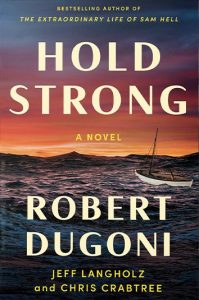A conversation with ‘Hold Strong’ co-author and educator Chris Crabtree ’81
 Chris Crabtree has spent the past 15 years teaching English and literature at a small international school in Guanacaste, Costa Rica, where he lives with his wife, Vera. His journey has been anything but linear. After growing up on the Eastside of Indianapolis, he served in the U.S. Peace Corps in Sierra Leone and eventually moved to Central America. A self-described “living, breathing Charles Bukowski poem of inventing and reinventing,” Crabtree has followed several career paths, but his love for writing and storytelling has remained constant. His latest work, Hold Strong, is a historical novel that shares the powerful true story of Father Thomas Scecina, the school’s namesake and a heroic WWII chaplain.
Chris Crabtree has spent the past 15 years teaching English and literature at a small international school in Guanacaste, Costa Rica, where he lives with his wife, Vera. His journey has been anything but linear. After growing up on the Eastside of Indianapolis, he served in the U.S. Peace Corps in Sierra Leone and eventually moved to Central America. A self-described “living, breathing Charles Bukowski poem of inventing and reinventing,” Crabtree has followed several career paths, but his love for writing and storytelling has remained constant. His latest work, Hold Strong, is a historical novel that shares the powerful true story of Father Thomas Scecina, the school’s namesake and a heroic WWII chaplain.
We caught up with Crabtree to talk about the story behind the novel.
What inspired you to write Hold Strong?
In some ways, this is an embarrassing question. I was writing a different manuscript, By Water, By Blood, which I couldn’t get anybody to read, and my protagonist was/is a Catholic priest. I was researching seminary life to develop that character, Father Cornelius Shine, and Googled Father Tom. I read what I found about him and the framework of his military career, his life in the Philippines, and his tragic death.
The embarrassing part is that I didn’t know any of it. It was likely presented to me at Scecina, but I had his story all wrong. I phoned my brother Kyle, and he had it wrong, too. We both thought he was a chaplain on the USS Indianapolis.
I quickly realized this was a story that needed to be told. I also knew instinctively that it was—and is—bigger than me. My friend Dr. Jeff Langholz, who I served with in the Peace Corps in Sierra Leone in the mid-’80s, visited Costa Rica. He’s the smartest human I know, but you should’ve seen his face when I told him about Father Tom and that I wanted to write this book.
Well, I poked the bear. We formed an alliance and resurrected a friendship, embarking on a decade-long journey of research and writing. It took Jeff and our mutual friend, Mike Kelleher, deep into the vast cellars of the National Archives in Washington, D.C., sifting through boxes and boxes of messages and reports. Much of that work is immortalized in this incredible story.
What challenges did you face, and what kept you going?
If you are searching for insights or a template for how to write a book, I am not your source. Jeff and I encountered the vast gulf between finding a great story and telling it. Jeff’s tenacity navigated these rough waters.
We worked together passing Word documents back and forth through Messenger, believe it or not. “Give me 800 words from inside the USS Shark.” Or, “Let’s get out of the hold and work on burials.” We did this for nine years.
We had several full iterations of Hold Strong, and it was getting better. Thanks to Jeff’s participation in an intensive writing workshop led by Robert (Bob) Dugoni, it started really taking shape. Bob had read our most recent version and gave us blunt and purposeful feedback, and we went to work again.
We still hadn’t produced writing that reached the level of the underlying story. We decided it was time to grow the team. Even though it’s out of the ordinary for Dugoni to co-author a book—he has 30 great books out there—he graciously put his unique skills to work, and the characters jumped off the pages.
Hold Strong is a team effort — a group of dedicated professionals who passionately wanted to get this story right. I am grateful to everyone who touched this story.
What message or feeling do you hope readers take away from Hold Strong?
It’s essential for every generation to understand through stories and storytelling that freedom is not free and is constantly under threat. And of course, Father Tom didn’t just “give that little extra.” He gave it all.
I feel honored to have been chosen to help bring Father Tom’s story to new audiences. God gave those soldiers and sailors a guardian angel in life, and he led them home.
Hold Strong wins a 5-star review
Chris’s passion for telling Father Tom’s story shines through in the interview above. That same spirit is echoed in a powerful review by alum Maribeth Ransel ’61.
 It is not often that a favorite author writes about a beloved icon. However, this time contemporary writer Robert Dugoni delivers an inspirational novel that includes a memorable portrayal of Scecina Memorial High School’s namesake, Father Thomas Scecina.
It is not often that a favorite author writes about a beloved icon. However, this time contemporary writer Robert Dugoni delivers an inspirational novel that includes a memorable portrayal of Scecina Memorial High School’s namesake, Father Thomas Scecina.
Thanks to 1981 alumnus Chris Crabtree, along with his friend, Jeff Langholz, the framework for Hold Strong was brought to the attention of Dugoni and billed as “a story that had to be told.”
This book was not written as a biography of Father Tom, but his story is faithfully told. Based on significant research by Crabtree and Langholz, Father Tom is presented as Scecina alumni, students and staff know him: a humble priest always willing “to give that little extra” to relieve the pain of the prisoners and to bring them peace, as best he could, in their final hours. Father Tom is depicted not only as a person of faith, but also as a person whose faith is challenged by the horrors of war.
The story of the Bataan Death March and the sinking of the Arisan Maru is not a tale for the faint of heart. The writers leave nothing to the imagination in their descriptions of the months of torture and starvation endured by the detainees. The inhumanity on the final journey of the Arisan Maru as it heads to its calamitous strike by an American torpedo will bring many to tears.
The story is told through the eyes of the two main protagonists, Sam and Sarah, 18-year-old sweethearts from Minnesota whose lives are upended by WWII. The tale of their journey through the war years and Sam’s eventual trip on the ill-fated ship is full of pain and sadness, but it is also a story of hope, patriotism, and faith.
Thanks to Chris Crabtree for carrying Father Tom in his heart, and to Dugoni, Crabtree and Langholz for bringing this extraordinary tale to the attention of those who may not know the history of Bataan, the sinking of the Arisan Maru, and the courage of Father Tom.
Though my 5-star review of Hold Strong has a bit of personal bias, the book garners a strong 4.7 stars on both Goodreads and Amazon. This is a “must read” for anyone who has an affiliation with Scecina.
— By Maribeth Taylor Ransel ’61, former interim president of Scecina (2006–2008)

